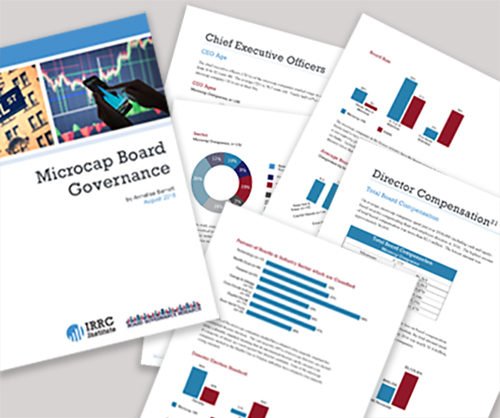A recent, groundbreaking piece of research entitled Microcap Board Governance (which was undertaken by Annalisa Barrett and commissioned by IRRC Institute) bridges a decades-long disconnect. To wit: “Despite microcap public companies’ importance in our capital markets, there is a paucity of studies examining their board composition and governance practices. This study provides insights into the current governance landscape in this asset class.”

Investors, academics, regulators, and governance experts will be parsing MBG data for years, but there are a handful of statistical insights that are immediately noteworthy.
- Nearly two-thirds of microcaps studied have no women serving on their boards.
- Eighty-three percent of directors studied don’t serve on any other public company boards.
- Eighty-four percent of microcaps studied don’t have stock ownership guidelines for directors.
- The average microcap technology company studied had fewer than six board members.
- Among microcaps with combined CEO/Chair roles, 70 percent of those studied had no lead independent directors.
- More than one-third of microcaps studied have fewer than 50 employees.
- The median cash retainer paid to board members of microcaps studied was $35K.
There are, of course, many takeaways from these data, and the countless other statistics set forth in MBG. But from my perspective, three stand out.
Governance “experts” need to speak more carefully. If I serve on a five-member board of an exchange-listed technology company with 45 employees, it’s not terribly additive to be told at large corporate governance events that adding separate risk, innovation, and cyber committees to our board is a “best practice.” That is, all of our independent board members are already on every committee, so creating new committees clearly isn’t a “best practice” for us, rather it’s just a wasteful exercise in semantics. As the MBG data make resolutely clear — corporate governance can’t possibly be one-size-fits-all. Accordingly, expert pronouncements that start with the words “Boards should…” are necessarily fraught.
Like it or not, stock ownership guidelines are coming to microcaps. The overwhelming majority of larger public companies have adopted stock ownership guidelines that require board members to use a predetermined percentage of annual cash stipends to purchase stock and to retain that stock during their tenures. Now that these MBG data are out in the open, five years from now, the percentage of microcaps that have stock ownership guidelines for directors is going to be a lot higher than 16 percent.
Ditto for lead independent directors. After McGraw Hill published The Perfect Corporate Board, I was asked during a keynote: “If you had to narrow it down to one major difference, Adam: why is governing small public companies such a unique challenge?” My answer was: “Unlike at large public companies, small public companies are often operated by CEOs with very little public company experience and governed by directors who also might lack material public company experience.” When you also consider that nearly three-quarters of companies with combined CEO/Chair roles don’t even have lead independent directors, you begin to understand why an inordinate percentage of shareholder activism every year… is in microcap companies.
Like every other current or former institutional investor, I have run across many microcap companies with terrific, value-added governance. Barrett’s Microcap Board Governance is undoubtedly going to grow those ranks dramatically.
This post was originally published in LinkedIn Pulse.
________________



